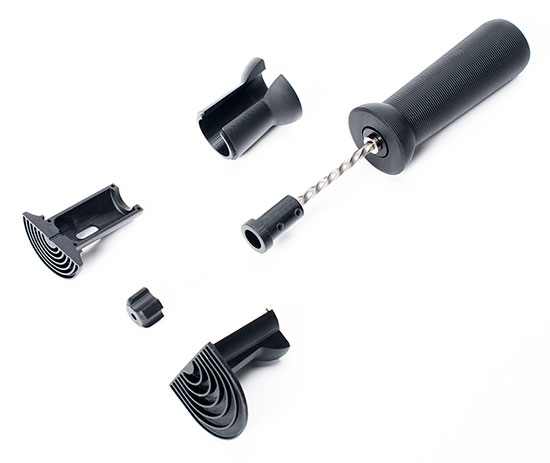The Carbon Platform: Enabling Digital Manufacturing at Any Scale
We are in the midst of a transformation where a transition from physical to digital has challenged the traditional ways to manufacture objects. Digital manufacturing has been the backbone of 3D printing since its inception in the early 1980s. The continued advances in qualitative and quantitative computation as well as the adoption of flexible, lean manufacturing methods has fueled the rise of digital manufacturing being used for both prototyping and production. In fact, the recent partnership between Protolabs and Carbon highlights how digital manufacturing is reinventing products from concept to creation.
Adding to Protolabs’ available technologies for rapid prototyping and on-demand production, Carbon’s suite of software, hardware, and materials provides a method for manufacturing end-use polymeric products at scale. Traditional approaches to additive manufacturing often have trade-offs between robust properties and acceptable surface finish. Carbon Digital Light Synthesis™ technology uses light projection and oxygen-permeable optics to produce parts with excellent mechanical properties and the resolution required for end-use parts.
As a result, parts printed with Carbon Digital Light Synthesis™ are comparable to injection-molded parts, but without the required tooling. The Carbon printers can produce parts with isotropic material properties and a robust industrial appearance. Further, the ability of Carbon's hardware to produce durable parts without requiring time-consuming, expensive steel tooling allows for a variety of application opportunities, such as nozzles, housings, snap-fit features, mechanical components, brackets, and more.

Bone drill built in Carbon's RPU material for added durability.
With the removal of the restrictions brought about by traditional manufacturing, customers often find other applications for digital manufacturing that may reduce costs and other barriers. For example, digital manufacturing enables engineers to create designs with fewer limitations than if their products required traditional manufacturing to be brought to life.
Whether routing a solid, liquid, or gas from point A to point B or maintaining a mechanical function, the high-performing parts and cost efficiency provided by Carbon digital manufacturing sets partners up for success.
For example, an elbow-bend, air- and water-tight cable and wire routing guide with an inlet/outlet on each end seems like a simple object. However, this traditionally would be comprised of two or three injection-molded components, requiring multiple tools or cavities for the proper molding of internal channels and sealing surfaces. It would then be assembled with several fasteners and O-rings to both hold the pieces in place and seal the interior. In contrast, producing this part via the Carbon Platform allows for part consolidation into one piece with fewer failure points as well as a reduced production process.
RPU 70, one of the rigid engineering polyurethane resins available from Carbon, was used in the above example and is a good choice for applications requiring strength, toughness, and moderate heat resistance. In addition to its use across a wide range of industries, including consumer products, automotive, and industrial applications, RPU 70 is blue card certified with a UL 94 HB flame resistance classification. Multi-piece consolidation of nozzles, rigid mounts and housings, and snap-fit features are excellent use cases. For applications requiring biocompatibility, RPU 70 also passes ISO 10993-5 for cytotoxicity and ISO 10993-10 for skin contact.
Alternatively, FPU 50, a flexible polyurethane-based resin, offers high impact strength and cycle life, and is designed to withstand repetitive stresses. Its mechanical properties make it ideal for tough enclosures, hinging mechanisms, re-closable fasteners, and friction fits.
Simplification and part consolidation create the design flexibility needed by engineers and users to compress development timelines and create space within existing products. Carbon Digital Light Synthesis™ technology can produce a full build platform of parts in the equivalent time it takes traditional manufacturing methods to produce just one prototype. This opens the door for creating parts directly from development, rapidly accelerating from design to validation to production implementation—truly manufacturing products at all scales.
As a member of Carbon’s Production Network, Protolabs has full access and support from the constantly evolving and improving Carbon ecosystem of software, hardware, and materials. Whether users are interested in initial product validation and prototyping, short-run production as a bridge to injection molding tooling, or engaging directly with the available materials for end-use products at full manufacturing scale, the solution can be found using Protolabs and the Carbon Platform.
Steve Wishau, Production Development Engineer, Carbon





